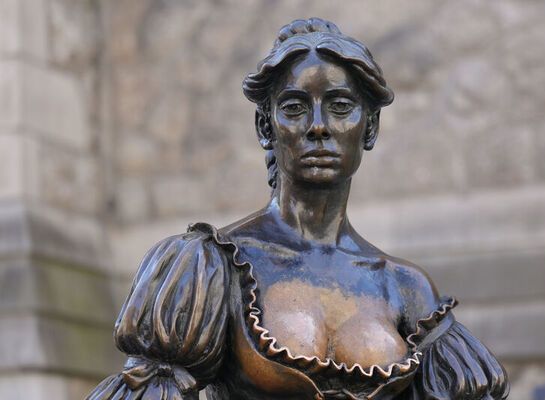By Ray O'Hanlon
The air tends to get thinner as you advance up the ladder from beat cop in the Bronx to First Deputy Chief at One Police Plaza in lower Manhattan.
It becomes positively rarified when you turn up for duty at Harvard.
As a kid running through the streets of Dublin, John Timoney would have played cops and robbers, cowboys and Indians and maybe even de Valera versus Michael Collins.
Harvard Fellows against Yale whatevers? Likely not.
Suffice it to say, it's a long way from Dublin's Liberties to Harvard Yard; longer still when the journey winds through the streets of the Bronx, Washington Heights, Philadelphia and Miami.
Timoney's latest beat is indeed in and around the leafy confines of Cambridge, Massachusetts. In recent weeks he has been a Fall Fellow at Harvard's Institute of Politics at the John F. Kennedy School of Government.
Timoney's latest beat partners make for an interesting group. They include Dennis Archer, former mayor of Detroit, Susan Milligan, national political reporter at the Boston Globe, Michèle Pierre-Louis, former prime minister of Haiti, Ophir Pines-Paz, once Israel's interior minister, and onetime U.S. Education Secretary, Margaret Spellings.
All come with impressive job titles. But so does John Timoney, a man who can point to a string of ranks and titles stretching back over four decades of hard edged police work.
Chief Timoney, as is the case with all cops, has stories to tell, and then some. He tells some in his book, "Beat Cop To Top Cop, A Tale Of Three Cites," a tome that is part autobiography, part treatise on the ever changing science of policing.
The book is published by University of Pennsylvania Press, a fact that, when combined with Timoney's Harvard assignment, would suggest a career in academia from now until retirement.
That would be a premature conclusion. There is a widespread view out there that John Timoney's police work has yet to run its full course.
Regardless of the road ahead, "Top Cop" covers a lot of ground already trod. Though it's a tale of three cities, it is impossible to leave the fourth most important city in Timoney's life out of the story. That city is, of course, Dublin, where Timoney spent the first thirteen years of his life.
You can still hear those years when he speaks, and while an Irish twang might not have raised too many eyebrows in New York or Philly, it would have stood out in Miami, where the latest chapter Timoney's policing career was played out.
You will come across differing opinions about Timoney in Miami, and indeed the other two cities where he rose from street patrol to the highest levels in two of the nation's biggest and most complex departments.
In a review of "Top Cop" in the Miami Herald, Susannah Nesmith wrote of Timoney: "He has the reputation as a police chief who will run down a purse snatcher, ride his bike into the center of a riot, bully a reporter and off-handedly offend some political faction - all before breakfast."
Nesmith, in this context, goes on to express some disappointment in Timoney's memoir. She was expecting the literary version of an Uzi. Instead, Timoney delivered something more akin to a fusillade from a SWAT team sniper's rifle.
It wasn't, she wrote, the writings of the Timoney some love, and some love to hate.
"The thoughtful, analytical Timoney few know comes out when he puts pen to paper. This Timoney is not as much fun, but what he writes is more important in the end. For anyone interested in how and why policing has changed over the past 40 years, Top Cop has a lot of the answers."
Timoney himself speaks of his book as a measured exercise, not an outright memoir, and certainly not a vehicle for blowing lids and settling scores.
"I didn't want to do a memoir because all you do is brag without addressing your screw-ups. I tried to write a halfway fair book," he told an interviewer for the Philadelphia Daily News.
Added the News: "The book details dramatic drops in crime that he oversaw in all three cities as well as controversies that dogged him in each town. He (Timoney) is keenly aware that many residents and politicians here still have a great deal of affection for him, something that was apparent during the 2007 mayoral election, when then-candidate Dwight Evans pledged to bring Timoney back if elected mayor."
All of which goes to show that despite the outward bluster and sometimes tough guy image, there lurks behind the badge the combined thinking of a politician and diplomat.
Still, a quick run through Internet references to Timoney speaks more of a cop who has never strayed too far from the street beat, no matter how high the rank attained.
Here's an example: "John Timoney doesn't have much time for standing on ceremony. The Dublin-born newly appointed police chief in Philadelphia was out jogging the other day and witnessed a purse snatcher going about his dubious business. Timoney dashed into action, collared the thief and held him until the local plod arrived. With guys like Timoney in town, who needs Batman?"
If the caped hero was a crusader for a more peaceful and just society, much of Timoney's police work has been on exactly the same lines. Though he has made headlines for sometimes taking uncompromising positions, Timoney has also expended a lot of time and effort in instilling the kind of discipline into departments that he has commanded that ultimately reduces tension and clashes on inner city street streets.
This recent report from the Miami Herald is telling in this regard: "Since early July, Miami police have been involved in four fatal shootings in the inner city, a deadly volley surpassing the total for all of last year.
"From Overtown to Little Haiti, shooting scenes have given way to sudden memorials, candlelight vigils and funerals in a community that struggles to balance a complicated relationship with the police.
"Though it's too soon to tell if the shootings were justified, the cluster of fatalities has many people in Overtown, Little Haiti, and Liberty City on edge. Only a decade ago the department's reputation suffered nationally as several officers were charged, and ultimately imprisoned, for plotting to plant guns in questionable shootings and lying to investigators.
"The U.S. Department of Justice and former Police Chief John Timoney were brought in to clean up the mess. At one point under Timoney, Miami police went almost two years without shooting at a person."
A tough cop, sure. A thinking one too. You bet.
John Timoney's long road to Harvard began in July 1969 when he became a New York Police Officer and was assigned to the 44th Precinct in the Bronx.
The young officer was clearly ambitious. In his first decade in uniform, Timoney earned his bachelor's and master's degrees in American history from John Jay College and Fordham University.
Timoney considered a career in teaching for a time but his policing job began to take on the kind of gravitational pull that is hard to resist: the upwards version.
Timoney's climb through the ranks of the NYPD was as steady as it was spectacular. By 1995 he was First Deputy Chief, second only to the commissioner. Three years later he was himself commissioner, thuogh in Philadelphia, and by 2003 he was Chief of Police in Miami.
Along the way, and in between police appointments, there were stints at various private security firms.
But Timoney, first and foremost, is a public servant - the blue clad version.
So is there another uniform in waiting?
He is often asked this question. In response, he told a Philadelphia reporter that he had a sense that something would happen.
"But where do you go? A fourth major city?"
Either that or back to a town where a Dublin kid has already made his most singular mark. Time and Timoney himself will tell.








